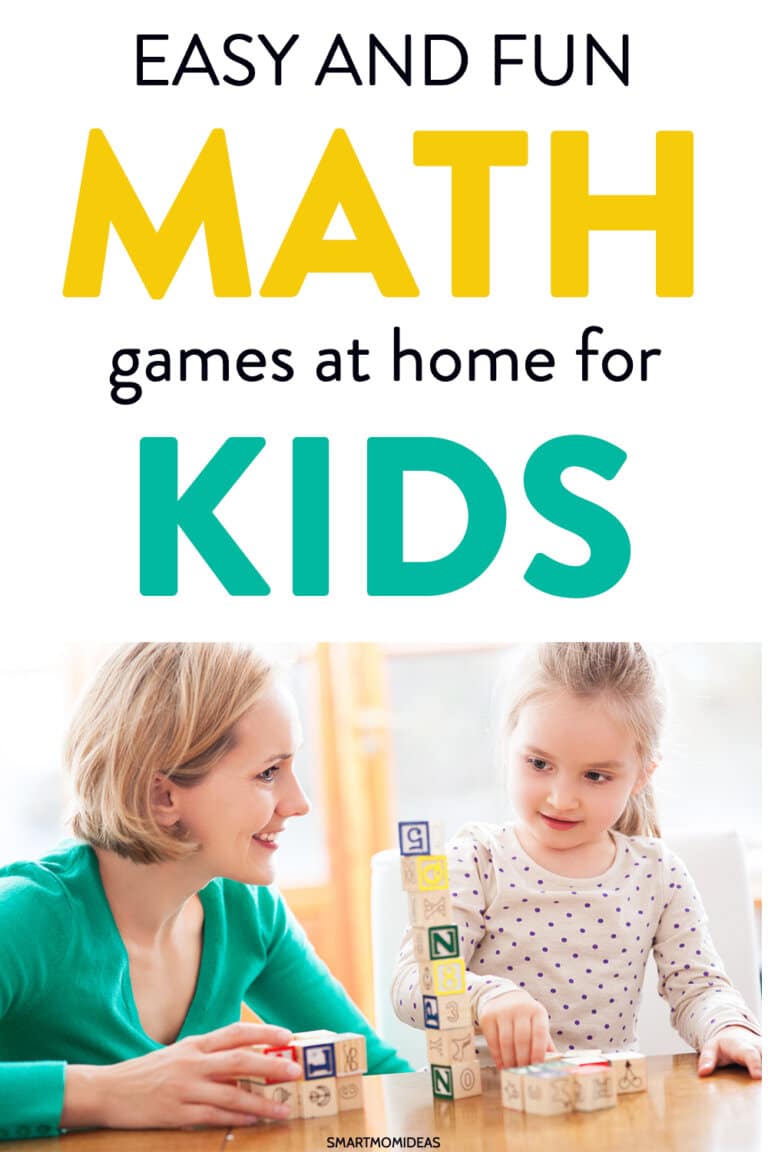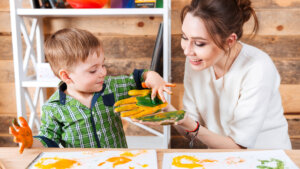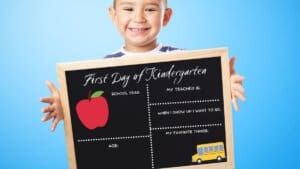Get some fun math games at home so you can teach your little ones all about numbers!

Hey mama! I don’t know about you, but when I was growing up, math wasn’t my best subject. I loved writing and that’s probably why I love blogging! 🙂
So, for me, math was one of those subjects that I struggled with and I can bet many kids today struggle with.
From early learners to the more advanced, math tends to be many students’ least favorite subjects, amiright?
One way to help kids who resist learning any school subject is to make it fun and enjoyable with games and other relatable activities.
When you can start early and encourage kids to love the more difficult subjects, like math, it will be less of a struggle for the student, the parents, and teachers later on.
So, to help you if you recently started homeschooling, I’ll go over some fun and cool math games to help your toddler and school-aged kid!
Let’s take a look at some games and resources for budding learners to get them excited about math.
Math Games For Toddlers
Before we get into math games for toddlers, I just want to let you know that having a place for learning in your home is vital.
Carve a corner in your living room or anywhere in your home that has a desk and materials for learning. Make sure to check out my post on homeschool desk ideas to get your kid in the learning mood.
The younger you can start with making math fun, the better. These math games for toddlers will get them interested in learning things like counting, simple addition, and subtraction.
Counting Together
Learning to count is the basis for every other type of math toddlers will work on.
Do your best to incorporate counting into everything you do with your child. When they take a bath, count the bath toys as you put them in the tub; count their tiny toes and fingers. When you go to the grocery store, have them help you count the apples that you are putting in the bag. Count anything and everything with them to help introduce them to the concept of numbers and math, even before they can talk.
My daughter absolutely loved these unicorn color counters and my son loved using these fun mini motor counters.
Object Sorting

You can easily sort objects with things you already have in your home.
Try this with building blocks, noodles, and larger beads (supervised of course). Sorting objects like this fun sorting pie not only helps kids learn to count but also helps them to understand groups and categories, which is another essential to learning math.
For example, if you are sorting blocks, have them separate the big blocks and little blocks, or sort them by color.
Shape Maming
Just like with counting, knowing their shapes is very important to the fundamentals of learning math.
Shape naming is an easy game that you can do with the things you already have in your house.
Point out different shapes and then ask your toddler to find the same shape around them. You can also do this when you’re out and about. In addition, you can use shape flashcards like these durable Carson Dellosa set and have your toddler point out the matching shapes around them.
Math Board Games
There are many math board games out there for toddlers and preschoolers to help them master the fundamental math concepts.
Playing educational board games is a fun and easy way to engage little ones without them feeling too overwhelmed.
If your toddler is a fan of Baby Shark (let’s face it, what toddler doesn’t already know the entire song by heart and will sing it repeatedly given the chance) then they will love this math game.
This Pre-K and Kindergarten math game focuses on several math concepts, counting, adding, multiplying, and memory.
In search of a game that focuses on teaching addition?
This addition and sight words game helps to develop problem solving skills and counting.
Your little learner is sure to get a kick out of this monkey balancing game.
They simply pick a card, place the correct number or monkeys on one side of the scale and the correct number on the other side to balance them out. A fun game that helps with both counting and number recognition.
Education Cubes

These fun education cubes are such a versatile piece of learning equipment.
They are soft blocks with clear pockets that you can add any kind of printable to. From pictures to letters or numbers, there are so many things you can do! Create a lifetime of learning with these customizable dice from baby to high school with endless possibilities.
Geometry and Spatial Reasoning
While these might sound like terms for middle and high school students, you can easily start teaching these concepts to much younger learners.
When you are working to identify shapes within your home and outside, this is a geometry concept. The kitchen table is a square, your water bottle is a cylinder.
Spatial reasoning is simply discussing where shapes are in relation to other objects.
Here’s a Youtube video that my twins like watching.
You can easily do this while reading picture books, watching a show, or with everyday items. Talk to your child and ask them questions like “where is the teddy bear? Is it on or under the couch?” You can also do this with size comparisons for objects, ask them things like, “which apple is bigger?”
Math Games for Kids
There are plenty of ways to encourage young children to incorporate math into their daily lives.
Here are some fun and easy math games that you can do with your kids that will actually get them thinking and enjoying math.
Measurements
You can use measurements in many ways with kids in your everyday life.
When you are cooking or baking, encourage kids to help in measuring ingredients. For example, if you are baking cookies and you want to double the recipe, work with them to figure out what the new measurement for each ingredient will be.
You can also use measurements in your everyday talk with them. Talk to them about how many ounces of water you drank, or how you really wanted a foot long sub, but you only got half of that and ask them how many inches that would be.
When it comes to measurements, kids can easily get confused when you use terms like quarts, liters, and ounces. Providing them with a visual when you talk about things can really help.
Websites
Kids love being on technology, so why not use it to your advantage and get them interested in using online learning resources. Here is a list of sites that have some great online math games for kids ages 5 and up.
Adaptive Mind – A math and reading site for students K-6th that makes learning fun. Oh yeah, and there’s cute little monsters that run the show.
Prodigy – An easy to use site that connects learning at school and at home.
Math is Fun – From simple puzzles and worksheets to physics and calculus, there is something for every level of math on this site.
Get the Math – You might not realize how much math we run into in our daily lives. This site encourages kids to solve real world math problems by working through engaging challenges.
Board Games

There are tons of really awesome math board games for kids over the age of 5.
Learning to do math in your head can be really hard.
The game of Poof! makes it fun and engaging.
For ages 9 and up, this math game focuses on doing mental math for addition, subtraction, multiplication, division, and square roots. A quick game at only 15 minutes, you can easily play with 2 to 6 people at once.
If your student is a little more advanced and really good at following directions, you might want to check out Prime Climb.
There are a lot of rules to this game, but students will certainly become fluent in their mathematical operations (addition, subtraction, multiplication, and division).
While not technically a board game, Math Wiz is a fun and fast paced math game that kids can play on their own.
They can easily choose from addition, subtraction, multiplication, or division and work to quickly solve math problems. Not to mention, it’s also a fully functional calculator!
Fake Money

Kids love to pretend with money. Using fake money will help them familiarize themselves with how to use (and appreciate) money in the real world. You can do things like set up a bake sale or grocery shopping in your home.
Simply label the cost of things and help your child figure out how much they need to pay for items and how to make change. Using fake money is also a great way to teach kids how to budget for items that they want.
War
I am sure you are familiar with the traditional game or war.
You take a deck or cards, divide them in half and give a half to each player. In order to play the basic game, each player puts a card down on the table at the same time, the player with the higher number wins that hand. You can also modify the game by using different mathematical operations.
For example, the first person to say the sum/difference/product of the numbers out loud wins that hand.
Logic Puzzles
Logic puzzles are another great way to incorporate other math elements into your child’s learning. Logic puzzles focus on things like sequencing, patterns, spatial reasoning, and build strong problem solving skills.
Here are a few really neat logic and brain puzzles your kids are sure to enjoy!
Kanoodle – Figure out this 2D and 3D puzzle.
Mastermind – A crazy strategy game that will make your child a mastermind!
Atlantis Escape – Escape the sinking city with these 60 different challenges.
SmartGames – Travel friendly games to get those little minds working for ages 3+.
Math Games for Homeschooling Your Kid
Math doesn’t have to be a bummer, it can actually be really cool and fun when you use games and learn to incorporate it into everyday life.
Give your kids the advantage of loving math with these fun math games that you can teach toddlers and older kids at home.
Share in the comments your go-to math games for toddlers or kids!
Please remember to pin me!




Leave a Reply